Freely Available British and Irish Public Legal Information
[Home] [Databases] [World Law] [Multidatabase Search] [Help] [Feedback]
United Kingdom Statutory Instruments
You are here: BAILII >> Databases >> United Kingdom Statutory Instruments >> The Solicitors (Disciplinary Proceedings) Rules 2007 No. 3588
URL: http://www.bailii.org/uk/legis/num_reg/2007/uksi_20073588_en_1.html
[New search] [Help]
The Solicitors (Disciplinary Proceedings) Rules 2007
Made
14th December 2007
Coming into force
14th January 2008
Arrangement of RULES
The Solicitors Disciplinary Tribunal in exercise of the powers conferred upon them by section 46 of the Solicitors Act 1974(1) hereby make the following Rules:
In accordance with section 46 of that Act the Master of the Rolls concurs with the making of these Rules.
PART 1 Introduction
Citation and Commencement
1. These Rules may be cited as the Solicitors (Disciplinary Proceedings) Rules 2007 and shall come into force on 14th January 2008.
Interpretation
2.–(1) In these Rules–
"the Act" means the Solicitors Act 1974;
"applicant" means a person making an application;
"application" means an application made under these Rules;
"case to answer" means an arguable or prima facie case;
"clerk" means any clerk to the Tribunal appointed under Rule 3 (including the Clerk);
"the Clerk" means the clerk to the Tribunal who is in office at the date these Rules come into force, or the clerk subsequently appointed under Rule 3(5);
"Division" means a division of three members of the Tribunal appointed for the hearing of an application or any matter connected with an application;
"the Law Society" includes any duly constituted committee of the Law Society or any body or person exercising delegated powers of the Law Society;
"respondent" means any party to an application other than the applicant;
"recognised body" has the same meaning as in section 9 of the Administration of Justice Act 1985(2);
"the Roll" means the Roll of Solicitors kept by the Law Society under section 6 of the Act;
"solicitor members" and "lay members" have the same meanings as in section 46 of the Act;
"Statement" means a written statement (including a witness statement) containing a statement of truth;
"the Tribunal" means the Solicitors Disciplinary Tribunal and where a Division has been appointed for the hearing of an application or any matter connected with it, includes a Division.
(2) References in these Rules to solicitors include, where appropriate, former solicitors.
(3) References in these Rules to registered foreign lawyers are references to lawyers whose names are entered in the register of foreign lawyers maintained under section 89 of the Courts and Legal Services Act 1990(3) and include, where appropriate, those who have ceased to be registered in that register or whose registration has been suspended.
(4) References in these Rules to registered European lawyers are references to lawyers whose names are entered in the register of registered European lawyers maintained by the Law Society under regulation 15 of the European Communities (Lawyer´s Practice) Regulations 2000(4) and include, where appropriate, those who have ceased to be registered in that register or whose registration has been suspended.
PART 2 Constitution
President, Vice-Presidents and Clerk
3.–(1) The President of the Tribunal holding office immediately before the date on which these rules come into force shall continue to hold office until the Tribunal´s annual general meeting next following 30th April 2009.
(2) Subject to paragraph (1), the Tribunal, by a simple majority, shall appoint one of the solicitor members to be its President to hold office for a period of 3 years and the person so appointed may be re-appointed for a further period not exceeding 3 years.
(3) The Tribunal, by a simple majority, shall appoint one solicitor member and one lay member to be its Vice-Presidents to hold office for such period or periods not exceeding 3 years as the Tribunal shall think fit and to exercise such functions as are exercisable under these rules by the President as he may direct.
(4) The Tribunal shall meet not less than once in each calendar year and shall publish an annual report, a copy of which shall be delivered to the Master of the Rolls and the Law Society.
(5) The Tribunal shall appoint a Clerk to the Tribunal.
(6) The Tribunal may also appoint other clerks, including clerks appointed to deal with a particular case or cases.
(7) A clerk appointed by the Tribunal under this rule shall be a solicitor or barrister of not less than 10 years standing
(8) A clerk shall vacate his office if–
(a) in the Tribunal´s opinion (with which the Master of the Rolls agrees) he is physically or mentally incapable of performing his duties; or
(b) he retires; or
(c) he is removed from office by a resolution of the Tribunal approved by the Master of the Rolls.
(9) The Clerk shall be responsible to the Tribunal for the administration of the Tribunal in an efficient manner and, for so long as he shall be remunerated by the Law Society, shall be regarded as seconded to the Tribunal.
(10) The services of a clerk may be provided to the Tribunal through a body independent of the Law Society and that body may employ him on such terms (including remuneration and pension provision) as the Tribunal shall think fit.
(11) The Tribunal may prescribe the duties to be performed by the clerks or for which they shall be responsible and those duties shall include arrangements for–
(a) the submission of applications for certification of a case to answer;
(b) making pre-listing arrangements including directions of an administrative nature;
(c) listing of and attendance at hearings;
(d) securing a record of hearings (by tape recording or other means);
(e) advising the Tribunal on matters of law or procedure as may be necessary or expedient;
(f) preparing summaries of allegations, evidence and submissions for inclusion in the Tribunal´s detailed findings;
(g) drawing orders and findings and filing them with the Law Society;
(h) the general supervision of other clerks and the Tribunal´s administration and staff; and
(i) maintaining records and collecting statistics required by the Tribunal.
Constitution of Divisions
4. Subject to rules 6(1) and 6(3), a Division shall be constituted for the hearing of any application or matter relating to an application. Two of the Division members shall be solicitor members and one shall be a lay member and (unless the President shall determine otherwise) a solicitor member shall act as Chairman.
PART 3 Applications
Applications in respect of solicitors, recognised bodies, registered European lawyers and registered foreign lawyers
5.–(1) An application to the Tribunal in respect of any allegation or complaint made in respect of a solicitor, a recognised body, a registered European lawyer or a registered foreign lawyer shall be in the form of Form 1 in the Schedule to these Rules.
(2) The application shall be supported by a Statement setting out the allegations and the facts and matters supporting the application and each allegation contained in it.
(3) The application, the Statement and any documents exhibited with them shall be delivered to the Clerk together with 5 additional copies and a further copy for any second or further respondent.
Certification of a case to answer
6.–(1) An application made under Rule 5 shall be considered by a solicitor member, who shall certify whether there is a case to answer.
(2) Paragraph (3) applies if–
(a) the solicitor member is minded not to certify that there is a case to answer; or
(b) in his opinion, the case is one of doubt or difficulty.
(3) If this paragraph applies, the application shall be considered by a panel of three members of the Tribunal, at least one of whom shall be a solicitor member and one a Lay member.
(4) If a solicitor member or a panel decides not to certify that a case to answer is established in accordance with this rule, the application shall be dismissed without formal order unless any party to the proceedings requires otherwise.
(5) If it is certified that there is a case to answer, a clerk shall serve the application, the Statement and any documents exhibited with them on each respondent in accordance with rule 10.
Supplementary statements
7.–(1) The applicant may file supplementary Statements with the Clerk containing additional facts or matters on which the applicant seeks to rely or further allegations and facts or matters in support of the application. Any supplementary Statement containing further allegations against the respondent shall be treated as though it were an application for the purposes of rules 5(3) and 6(1), (2), (3) and (5).
(2) Without prejudice to any further application which may be made, no supplementary Statement shall, unless by order of the Tribunal, be filed later than 12 months after the date of the Application or less than 30 days before the date fixed for the hearing of the application.
Applications by the Law Society against solicitors´ employees
8.–(1) An application made by the Law Society for an order under section 43(2) of the Act shall be in the form of Form 2 in the Schedule to these rules.
(2) In a case where the Law Society has applied to the Tribunal for an order under section 43(2) of the Act, the solicitor, recognised body, or registered European lawyer by or for whose benefit the respondent is employed or remunerated–
(a) may also be named or joined as a respondent to the application; and
(b) shall be joined as a respondent if the Tribunal so direct.
(3) The provisions of rules 5(2) and (3) and 6(1) to (5) shall apply to every application made under section 43(2) of the Act.
(4) An application for a review of an order made under section 43(3) of the Act shall be in the form of Form 3 in the Schedule to these Rules.
(5) Every application under section 43(3) of the Act shall be served on the Law Society and the Law Society shall file with the Clerk a Statement setting out the facts and matters on which it relied in making the order under Section 43(2) of the Act.
Other Applications
9.–(1) This rule applies to applications made to the Tribunal under section 47 of the Act–
(a) by a former solicitor seeking restoration to the Roll;
(b) by a person seeking restoration to the register of European lawyers or the register of foreign lawyers if his name has been removed from either register;
(c) by a solicitor, registered foreign lawyer or registered European lawyer seeking the termination of an indefinite period of suspension from practice imposed by the Tribunal.
(2) An application to which this rule applies shall be made in the form of Form 4 in the Schedule to these Rules.
(3) The Law Society shall be a respondent to every application to which this rule applies.
(4) The applicant shall serve on the Law Society–
(a) a copy of the application; and
(b) a Statement in support of the application.
(5) Every application to which this rule applies shall be advertised by the applicant once in the Law Society´s Gazette and once in a newspaper circulating in the area of the applicant´s former practice.
(6) Any person may, no later than 10 days before the hearing date of an application to which this rule applies, serve on the Tribunal and the parties to the application notice of his intention to oppose the grant of the application and the Tribunal may allow that person to appear before the Tribunal at the hearing of the application, call evidence and make representations upon which the Tribunal may allow him to be cross-examined.
PART 4 Procedure and rules of evidence
Service of documents
10.–(1) Any application, Statement or other document required to be served under rules 6(5), 8(5) and 9(4) shall be served–
(a) personally; or
(b) by sending by guaranteed delivery post or other guaranteed and acknowledged delivery to the last known place of business or abode of the person to be served; and
(c) in such other manner as the Tribunal may direct.
(2) Any Statement, notice or document other than one which is required to be served in accordance with paragraph (1) may be served in accordance with that paragraph.
(3) In the case of a solicitor, any Statement, notice or other document required to be served under these rules may be served–
(a) by leaving it at the address shown as his place of business in the register kept by the Law Society under section 9 of the Act; or
(b) by any of the methods mentioned in paragraphs (a) to (d) of rule 6.2(1) of the Civil Procedure Rules 1998(5) as they may be modified, amended or replaced.
(4) Any application, Statement, notice or other document served in accordance with paragraph (1) shall be deemed served on the second working day following the day on which it is delivered, posted or transmitted.
(5) An application, Statement, notice or other document delivered to the last known place of business or abode of the person to be served may be regarded by the Tribunal as duly served if it is satisfied that it is reasonable to expect that the application, Statement, notice or other document has been received by or brought to the attention of the person to be served.
(6) If the Tribunal requires the advertisement of any proceedings under these Rules, it may regard that advertisement as service for the purposes of these Rules.
Directions
11.–(1) A clerk may give any directions deemed necessary or appropriate for the hearing of any matter brought before the Tribunal.
(2) Without prejudice to paragraph (1), directions may be made about documentation, inspection, Statements, skeleton arguments and the place or time of any hearing.
(3) A clerk may appoint a time and place for the review of the progress of the matter and shall notify the parties of the date, time and place of any such review.
(4) A clerk may refer to the Tribunal any matter for a decision or directions and the Tribunal may itself or on the application of any party make an order on such terms as to the Tribunal shall appear just–
(a) to give consent to the withdrawal of an application or allegation in respect of which a case to answer has been certified;
(b) to adjourn any hearing listed for directions or for a substantive hearing;
(c) to agree to the amendment of any application or allegation or the correction of any matter;
(d) to make any directions which shall appear necessary or appropriate to secure the timely hearing of the matter.
(5) Any hearing under this rule shall be held in public unless rules 12(5) or (6) apply.
(6) No application or allegation in respect of which a case to answer has been certified may be withdrawn without the consent of the Tribunal.
Listing
12.–(1) Unless the Tribunal has made directions in respect of the hearing, a clerk shall appoint a date for the hearing by the Tribunal and shall give notice of the date to the parties. The hearing shall not, unless all the parties have agreed or the Tribunal has so ordered, take place sooner than the expiry of a period of 42 days beginning with the date of service of the notice appointing the date of the hearing.
(2) A clerk shall arrange for the hearing date to be published in the Daily Cause List of the High Court.
(3) Subject to paragraphs (5) and (6) every hearing shall take place in public.
(4) Any party to an application and any person who claims to be affected by it may seek an order from the Tribunal that the hearing or part of it be conducted in private on the grounds of–
(a) exceptional hardship; or
(b) exceptional prejudice,
to a party, a witness or any person affected by the application.
(5) If it is satisfied that those grounds are met, the Tribunal shall conduct the hearing or part of it in private and make such order as shall appear to it to be just and proper.
(6) The Tribunal may, before or during a hearing, direct that the hearing or part of it be held in private if–
(a) the Tribunal is satisfied that it would have granted an application under paragraph (4) had one been made; or
(b) in the Tribunal´s view a hearing in public would prejudice the interests of justice.
Evidence: general
13.–(1) Subject to the following provisions of this rule, the Civil Evidence Act 1968(6), and the Civil Evidence Act 1995(7) shall apply in relation to proceedings before the Tribunal in the same manner as they apply in relation to civil proceedings.
(2) Any notice given under the provisions of the Acts mentioned in paragraph (1) shall be given no later than 21 days before the date fixed for the hearing of an application.
(3) Any counter-notice shall be given no later than 10 days before the date fixed for the hearing.
(4) No later than 28 days before the date fixed for the hearing of an application, the applicant may, by written notice, require any other party to the application to indicate to him, no later than the date on which the period of 14 days from the date of the giving of the notice expires, which of any facts set out in the Statement submitted in support of the application are in dispute.
(5) Failure to reply to such a notice shall be material only in relation to the question of costs.
(6) Any party to an application may, by written notice, not later than nine days before the date fixed for the hearing, request any other party to agree that any document may be admitted as evidence.
(7) If any other party desires to challenge the authenticity of a document which is the subject of paragraph (6), he shall no later than the date on which the period of six days beginning with the date on which the notice was served, give notice that he does not agree to the admission of the document and that he requires that its authenticity be proved at the hearing.
(8) If the recipient of a notice given under paragraph (6) does not give a notice in response within the period mentioned in paragraph (7), he shall be deemed to have admitted the document unless otherwise ordered by the Tribunal.
(9) A party to an application may, pursuant to Section 46(11) of the Act, require the attendance at the hearing of any person or the production of any document relevant to the proceedings and any summons for that purpose shall be in the form of Form 5 in the Schedule to these Rules.
(10) At the discretion of the Tribunal, the strict rules of evidence shall not apply at a hearing before the Tribunal.
Written evidence
14.–(1) The Tribunal may in its discretion, in respect of a whole case or of any particular fact or facts, proceed and act upon evidence given by Statement.
(2) Every Statement upon which any party proposes to rely shall be filed with the Clerk and served on all other parties to the application in question no later than 21 days before the date fixed for the hearing of the application together with a notice in the form of Form 6 in the Schedule to these Rules.
(3) Any party on whom a notice has been served under paragraph (2) and who requires the attendance, at the hearing, of the witness in question shall, no later than 9 days before the date of the hearing require, in writing, the other party to produce the witness at the hearing.
(4) If no party requires the attendance of a witness in accordance with the provisions of this rule, the Tribunal may accept the Statement in question in evidence.
(5) If a witness who has been required to attend a hearing in accordance with the provisions of this Rule fails to do so, the onus shall be on the party seeking to rely on the Statement of that witness to show why the Statement should be accepted in evidence.
(6) If any party intends to call as a witness any person who has not produced a Statement, he must, no later than 10 days before the date fixed for the hearing, notify the Clerk and any other party to the proceedings of his intention and forthwith serve a copy of a written proof of evidence on the other party and lodge five copies of the proof with the Clerk.
Previous findings of record
15.–(1) In any proceedings before the Tribunal which relate to the decision of another court or tribunal, the following rules shall apply if it is proved that the decision relates to the relevant party to the application.
(2) A conviction for a criminal offence may be proved by the production of a certified copy of the certificate of conviction relating to the offence and proof of a conviction shall constitute evidence that the person in question was guilty of the offence. The findings of fact upon which that conviction was based shall be admissible as conclusive proof of those facts save in exceptional circumstances.
(3) The finding of and penalty imposed by any tribunal in or outside England and Wales exercising a professional disciplinary jurisdiction may be proved by producing a certified copy of the order, finding or note of penalty in question and the findings of fact upon which the finding in question was based shall be admissible as proof but not conclusive proof of the facts in question.
(4) The judgment of any civil court in any jurisdiction may be proved by producing a certified copy of the judgment and the findings of fact upon which that judgment was based shall be admissible as proof but not conclusive proof of those facts.
Hearings and Findings
16.–(1) The hearing of an application shall take place at such time and place as shall be considered by the Tribunal to be appropriate and convenient.
(2) If the Tribunal is satisfied that notice of the hearing was served on the respondent in accordance with these Rules, the Tribunal shall have power to hear and determine an application notwithstanding that the Respondent fails to attend in person or is not represented at the hearing.
(3) At the conclusion of the hearing, the Tribunal shall make a finding as to whether any or all of the allegations in the application have been substantiated whereupon a clerk shall inform the Tribunal whether in any previous disciplinary proceedings before the Tribunal allegations were found to have been substantiated against the Respondent.
(4) The Respondent shall be entitled to make submissions by way of mitigation in respect of any sanction (including any order for costs) which the Tribunal may impose.
(5) The Tribunal may announce its decision and make an order at the conclusion of the hearing or may reserve its decision for announcement at a later date. In either case the announcement shall be made in public and in either case the Tribunal shall as soon as is practicable deliver to the applicant and to the respondent its detailed written findings which shall include its reasons and conclusions upon the evidence before it.
The Order
17.–(1) An order made under rule 16(5) shall be signed by a member of the Tribunal upon the announcement of the decision and shall, subject to paragraph (2) be filed forthwith with the Law Society.
(2) The Tribunal may suspend the filing of the Order if it appears to the Tribunal that there is good reason to do so, in which event the Order shall not take effect (including any suspension from practice) until it is filed with the Law Society.
PART 5 Miscellaneous
Costs
18.–(1) The Tribunal may make such order as to costs as the Tribunal shall think fit including an order–
(a) disallowing costs incurred unnecessarily; or
(b) that costs be paid by any party judged to be responsible for wasted or unnecessary costs, whether arising through non compliance with time limits or otherwise.
(2) The Tribunal may order that any party bear the whole or a part or a proportion of the costs.
(3) The amount of costs to be paid may either be fixed by the Tribunal or be subject to detailed assessment by a Costs Judge.
(4) The Tribunal may also make an order as to costs under this Rule–
(a) where any application or allegation is withdrawn or amended;
(b) where no allegation of misconduct (including an application under Section 43 of the Solicitors Act) is proved against a respondent.
Re-hearing where respondent neither appears nor is represented
19.–(1) At any time before the filing of the Tribunal´s Order with the Law Society under rule 17 or before the expiry of the period of 14 days beginning with the date of the filing of the order, the respondent may apply to the Tribunal for a re-hearing of an application if–
(a) he neither attended in person nor was represented at the hearing of the application in question; and
(b) the Tribunal determined the application in his absence.
(2) An application for a re-hearing under this Rule shall be made in the form of Form 7 in the Schedule to these Rules and shall be supported by a Statement setting out the facts upon which the applicant wishes to rely.
(3) If satisfied that it is just so to do, the Tribunal may grant the application upon such terms, including as to costs, as it thinks fit. The re-hearing shall be held before a Division of the Tribunal comprised of different members from those who heard the original application.
Adjournment for Law Society to investigate
20. In the case of an application by a person other than the Law Society, the Tribunal may, before or after certification of a case to answer, adjourn the matter for a period not exceeding 3 months to enable the Law Society to carry out its own investigations and–
(a) if it thinks fit, initiate its own application; or
(b) by agreement with the applicant, undertake the application.
Miscellaneous
21.–(1) Subject to the provisions of these Rules, the Tribunal may regulate its own procedure.
(2) The Tribunal may dispense with any requirements of these Rules in respect of notices, Statements, witnesses, service or time in any case where it appears to the Tribunal to be just so to do.
(3) The Tribunal (or a panel of Tribunal members consisting of not less than 5 members of whom not less than 2 shall be lay members) may give such notices or make such directions concerning the practices or procedures of the Tribunal as are consistent with these Rules and as shall seem appropriate.
(4) The Tribunal shall promulgate notices or directions given or made under paragraph (3) under the authority of the President. Practice Directions in force prior to the date on which these Rules come into force shall remain in full force and effect after that date.
(5) Where the Tribunal has made a finding based solely upon the certificate of conviction for a criminal offence which is subsequently quashed the Tribunal may, on the application of the Law Society or the respondent to the application in respect of which the finding arose, revoke its finding and make such order as to costs as shall appear to be just in the circumstances.
Revocation
22. The Solicitors (Disciplinary Proceedings) Rules 1994(8) are revoked.
Transitional provision
23. These Rules shall not apply to proceedings in which an Application is made before the date on which these rules came into force and those proceedings shall be subject to the Solicitors (Disciplinary Proceedings) Rules 1994 as if they had not been revoked.
Signed by authority of the Solicitors´ Disciplinary Tribunal and approved by the Master of the Rolls
Anthony Isaacs
President
Sir Anthony Clarke
Master of the Rolls
14th December 2007
SCHEDULE FORMS
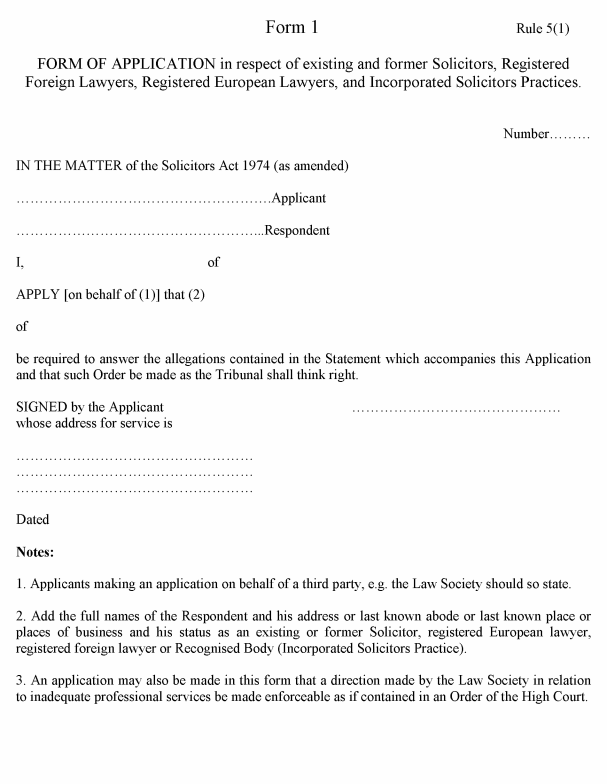
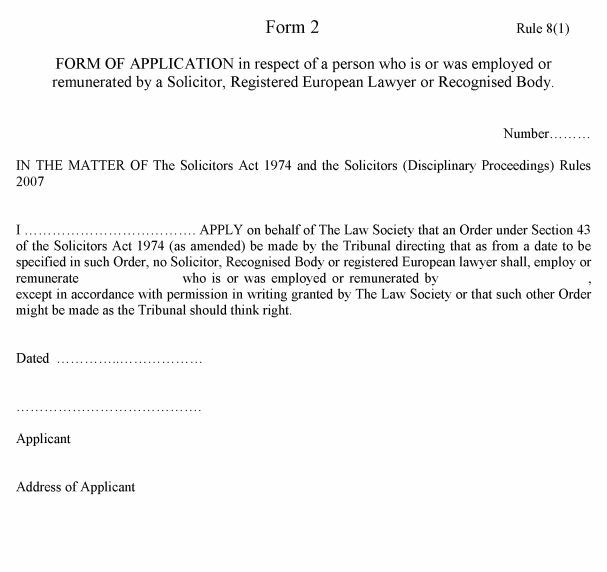
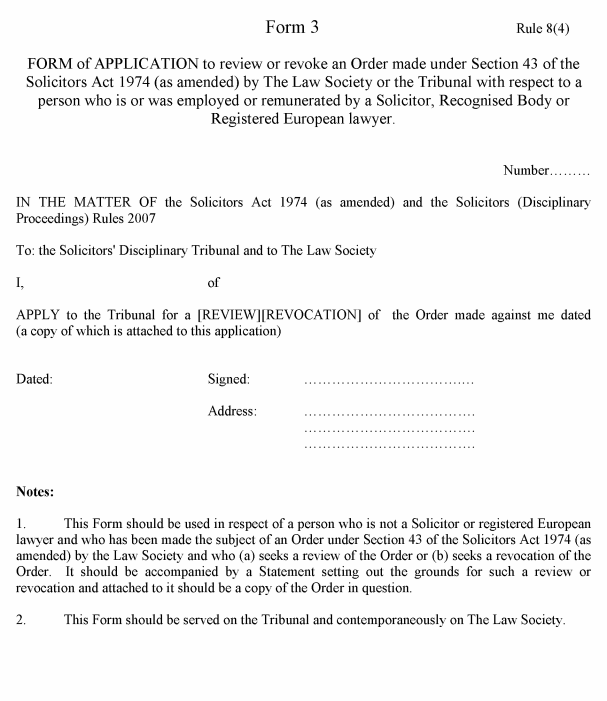
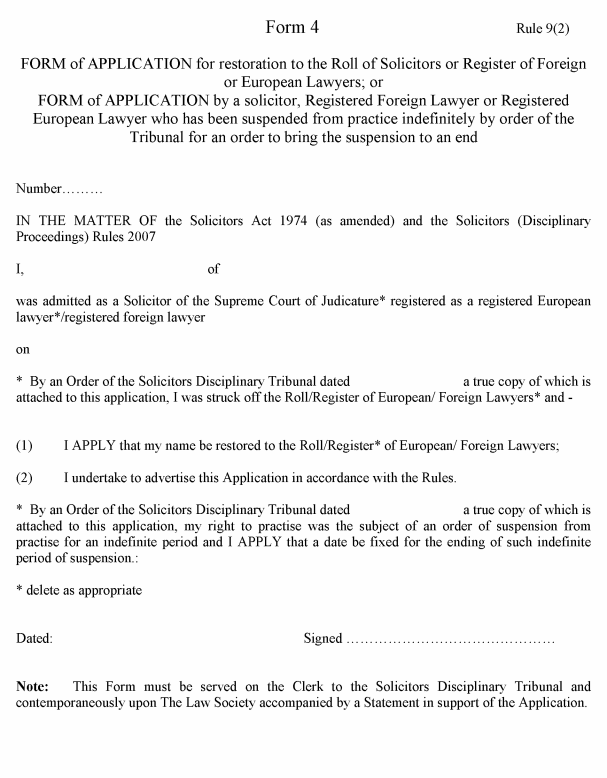
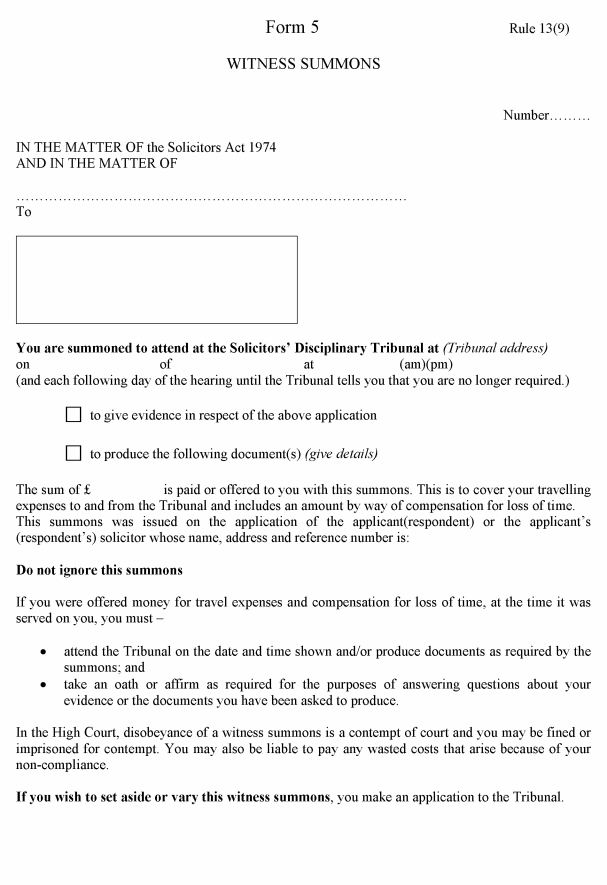
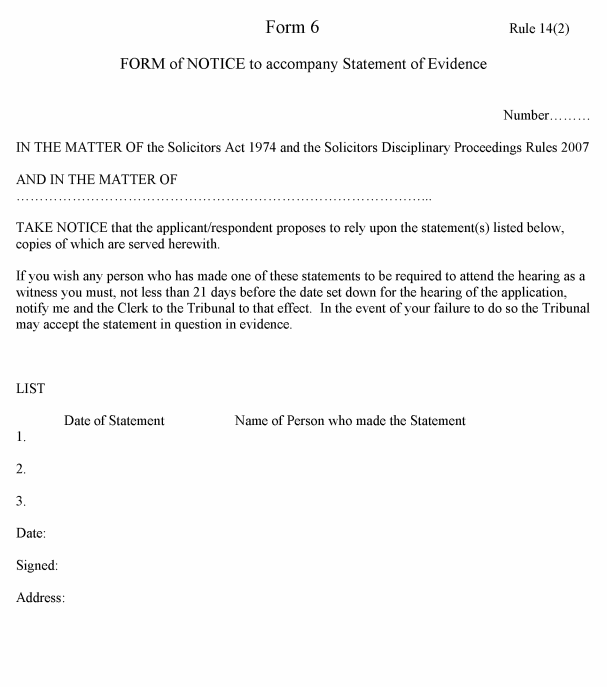
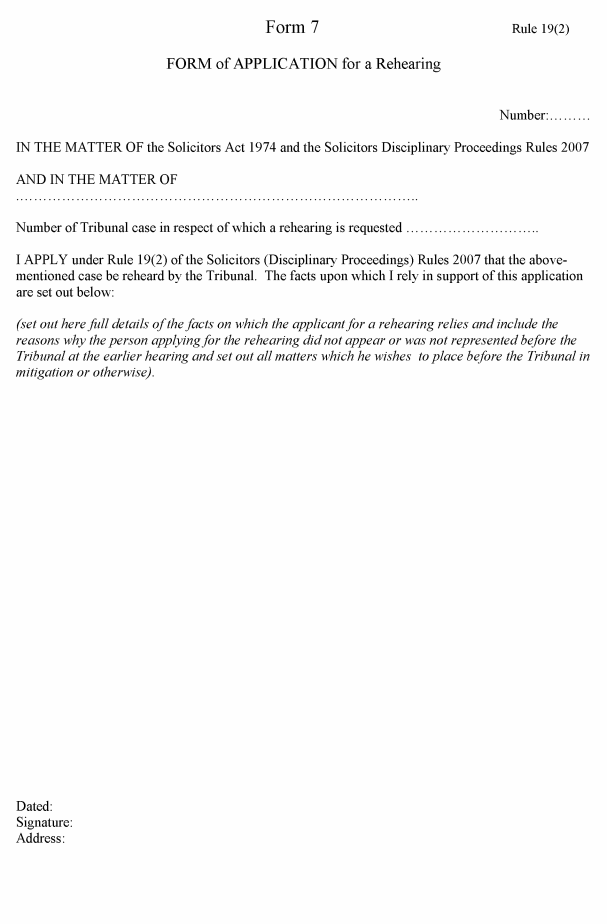
Explanatory Note
(This note is not part of the Order)
These Rules regulate procedure for the making, hearing and determination of applications made to the Solicitors´ Disciplinary Tribunal constituted under the Solicitors Act 1974.
In particular, the rules make provision about the following–
(1) the constitution of the Tribunal,
(2) applications to the Tribunal,
(3) procedure and rules of evidence,
(4) other miscellaneous matters.
The Rules revoke the Solicitors (Disciplinary Proceedings) Rules 1994.
Amended by correction slip on 01 March 2009
